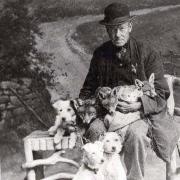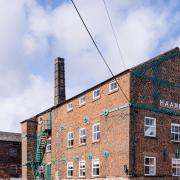Pat Ashworth meets the celebrated Perween Warsi, whose Derby-based company, S&A Foods, is one of the county's biggest success stories
Rags don’t actually come into it, but a journey that starts with making samosas on the kitchen table and ends with running a multi-million pound food company has got to be in the rags to riches tradition. There’s a difference, though. Where most people embark on such a journey to make money, Perween Warsi had a much more modest aim. She couldn’t buy the good Indian food she loved and so she set about changing that. It really was that simple.
The daughter of a government engineer, she spent a happy childhood and adolescence in India, surrounded by a loving family. She attributes her ability to adapt to different environments to the fact that the family moved every two or three years as her father’s job required: going from one city to another was exciting, ‘like an extended holiday,’ she remembers with pleasure.
Her mother tells Perween that she was interested in cooking from the age of two: Perween remembers it as ‘helping my mum, playing with flours and things like that. My grandma lived with us and bought me tiny pots and pans and kitchen tools, but what I really wanted was my own rolling pin,’ she says. And when she got it, the first dish she made was puri for her granddad. ‘I was told how delighted he was that this tiny granddaughter had made puri for him. It’s the biggest gift anyone can give, the gift of love, and he picked me up and gave me big hug,’ she remembers.
‘My mum and grandma were passionate about food. They made sure every dish was cooked to the ‘wow’ taste – we always looked for the word, [Maza] after a meal, when somebody said that. Meals were a very important time for us: all the family round the table at the same time in one room, and the dishes cooked for everybody – it was a good discipline,’ she says. ‘You talk to your family about your day, your work, you share your experience, your mum and dad tell you all the lessons of life – you soak all that up as a child. We learned that the family is one unit and sticks together. And we learned always to be grateful for the food that comes to the table, because so many in those days went to bed with empty stomachs.’
She recalls with her shy smile the embarrassment she felt when she took her first Home Economics exam at secondary school, where the pupils had to cook and serve food but didn’t know what dishes they would be asked to make. ‘Out of love and care, my mum took every ingredient you could possibly think of and gave it to my nanny, who carried it into school in a great big cane basket on her head. All the girls started laughing and saying, "She has her nanny with her!"’ she remembers. ‘Obviously I passed, and everyone was very chuffed and delighted.’
Perween was married at 17, and followed her new husband, a doctor, to the UK in 1975. Until that time, she had never once been out alone and unaccompanied, even to a shop, and arriving at Delhi airport on her own ‘with a baby on one arm and a little purse on the other’, she was caught up in the chaos of the airport and the m�l�e that was the fight to get a boarding card –‘A boarding card? What was that?’ Having been told it would be cold in England in January, she had wrapped her small son up in six layers of clothing and as she ran around trying to get on the plane, had no idea that his screams resulted from being far too hot. ‘I feel bad about it, even now,’ she says, recalling the air hostess peeling back the layers and exclaiming to her, ‘What have you done?’
She arrived at Heathrow in warm winter sunshine, and travelled to Rhyl, where her husband was working in the hospital. She brought two things with her: her rolling pin –‘My kitchen friend – I still have that same one and it’s rolled thousands and thousands of samosas at home’ – and the flour she needed to make chapattis. Though homesick and missing her family, she found her husband’s colleagues and the hospital staff welcoming and despite speaking very little English at that stage, she quickly made friends.
But shopping for the dishes she craved and finding ‘nothing but marrow and cauliflower and peas’, she yearned for ‘my aubergines, my okra, my coriander, my chillies – I couldn’t imagine life without green chillies.’ The coastal wind almost blew her away, she remembers, when she put her son into a pushchair and tried to go in search of the elusive ingredients, and all she could find was rice, bread flour with which to make chapattis, and a pack of pink lentils.
The family moved to Dewsbury, where Perween’s husband was to do vocational training to become a GP. Winters had been cold but summers beautiful in Wales and she was reluctant to leave, but again found a warm welcome in Yorkshire, where her second son was born. Life was tough, she remembers, with no family or friends to help with the new baby, and she was still missing her dishes. It wasn’t until the next move – to Derby, where the first challenge was to live in a one room flat over the busy surgery – that she eventually had time on her hands. With her two sons now day boys at Repton, she pursued what was on the supermarket shelves and felt only disappointment at the inferior sauces she found.
‘S&A has been born out of dissatisfaction with quality. It’s in the DNA,’ she says simply. ‘My husband was a successful, hardworking doctor, who earned a lot and looked after us, so money wasn’t the driver. I just wanted to prove to the nation how tasty Indian food could be, because I’m so proud of it.’ Her logic, she says, was simple: ‘I have great food and somebody is selling not so good food. So surely people will buy mine?’
So she made half a dozen samosas and took them round to her local takeaway. ‘I asked them, "Put it on your shelves and see whether people will buy it,"’ she suggested. ‘I got brilliant feedback. They started flying off the shelves like... well, like hot samosas.’ They were so popular that she was asked to supply the shop on a permanent basis, and she took on five ladies to help her in the kitchen. ‘We were crammed in there, with big woks and lots of frying, and rolling pins and flours and potatoes... It was like a merry-go-round, with someone always having to move out of a space to let someone else in.’
The women were treasures, she says: two had never worked in their lives; others only spoke Punjabi, but problems were surmounted, empowerment ensued, great times were had and they all worked together as a family. When a neighbour complained anonymously about the cooking smells, they decided they would work at night instead, and so there were no more complaints. It got busier and busier. ‘I wanted to sell only the absolute wow, and that’s what we were making,’ Perween says. ‘My aim became to get these good products to people all over the country.’ And so, with no business background or qualifications, and no training, she set about making hundreds of calls to supermarkets, confident that, ’My food was great and people would love it.’
The break came when ASDA asked her to send samples. ‘They came back with the message, "We like your food and we want to buy from you,"’ she says. ‘For a designer, for a cook who is passionate about food, to hear that yours has been voted number one, has got the biggest score, is a dream come true.’ So they set up S&A Foods (named after her sons, Sadiq and Abid) in a small unit in a converted garage and started producing from there. Of her husband Talib’s input, she says fervently: ‘He has been really instrumental in helping me set up the business. I’m really grateful to him and thankful for coming to this country. He was a very busy doctor, very successful and popular, and in between house calls and surgeries and clinics, found whatever time he could to help get it off the ground.’
Perween found herself working up to 16 hours a day, fitting in the school run, doing home cooking, managing ‘life and the family and the business’. ‘And do you know what?’ she asks. ‘I loved it. It was the most exciting time of my life. Seeing things happen, recruiting people, growing the business, launching new things... it was amazing. I think if you have a clear purpose and a goal, you can find a path. You prioritise what’s important.’
The day this first small factory was approved – after an eleventh hour panic in which friends worked all night to be ready for its inspection in the morning – was a milestone. Ask how she did it, and Perween reflects, ‘There are always challenges when you set up a business. Panicking is no driver for a successful outcome: you have to stay cool and calm. The positive attitude allows a mindset that will let other ideas flow in so that you can think rationally. It’s very important that people who work in my company are positive and open minded. I have a solution mentality, always looking for "how can I do it", rather than "it can’t be done".’
From snacks, the company extended into the recipe dish market for rices and curries. It grew to the point in 1987 where, in a business where cash is king, an investor was needed, and came in the shape of the high-flying and very successful plc, Hughes Food Group (HFG). Now came entry into the ready meals market, another milestone. S&A moved into the enormous purpose-built factory it still occupies on Shaftsbury Street South. ‘Products were flying, we were growing, everything was working... but life is full of surprises,’ Perween says of 1990, the year when it could all have fallen apart.
For in 1990, HFG went into receivership. In what Perween – who is a diminutive figure – acknowledges was a nerve-racking experience, she confronted the group’s chief executive – ‘a big chief with several years of experience, helicopters and things – and asked him to sell her shares in S&A back to her. ‘We were turning over three million a year,’ she remembers. ‘I kept asking and he kept refusing, because he said we were the jewel in HFG’s crown, the shining star, the company with a future.’ The battle raged for nine months and turned into a war. With control and the purse strings in the receivers’ hands, the future of S&A was at stake, and in the meantime, the products planned for launch were being launched.
‘We’re not quitters,’ Perween says simply. ‘I don’t give up. I’m a fighter. My suppliers were with me and the customers were supportive.’ She won the battle in November 1991, when she led a management buyout, and remembers signing the papers at three o’clock in the morning. ‘They were tough times. When people come from large organisations and sit the other side of the table and say, "We’re going to buy your company", and you say, "No, you’re not", that’s heartbreaking,’ she observes quietly. ‘Here’s the business you’ve built and nurtured and worked so hard for, and someone is saying, "I’m going to take your baby away."’
She regained 100 per cent control of the company in 2004. Perween remains passionate: about quality and delicious ethnic food; about high standards that are always consistent – ‘I make a lot of noise if I don’t see things as they’re supposed to be – I bet I drive people mad, but hey...’; about not just surviving but thriving; about the empowerment of women in particular, remembering women in India whom she describes as ‘uncut diamonds – creative, witty, intelligent, hardworking but never given the chance to shine’; about exceeding customer expectations.
She pays huge tribute to a committed, hardworking team: a chain, she says, where everyone relies on each other. And she is immensely proud of the culture of the factory, where 27 languages are spoken, ‘in harmony, under one roof’. She employs over 500 workers and is expanding into Europe. Long service and innovation are celebrated and rewarded: ‘It’s about sharing your success and having fun together as well as work. It’s a give and take business,’ she says. ‘We work for a common goal: to make S&A successful.’
If you passed Perween Warsi in the street, a slight, dignified figure in a black suit, she would attract no particular attention. She has been heaped with honours, including an MBE in 1997 and a CBE in 2002. She has an honorary MBA from the University of Derby, an Honorary Doctorate from the University of Coventry and sits on Derby City Council’s Renaissance Board.
She takes credit only for coming up with the ideas and starting the business: a lot of people have since helped S&A get to where it is today, she says including all her colleagues on the factory floor. She praises Derby City Council and the people of Derby for the support she has received, and concludes, ‘If you have the attitude to learn, you can learn whatever you want to learn. Determination is like the proof of how much you want something. If you really want something badly, then you will work for it.’


























